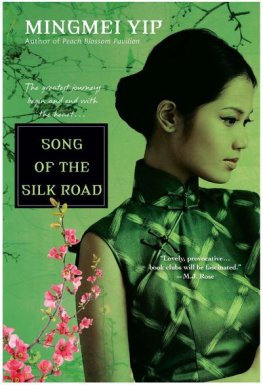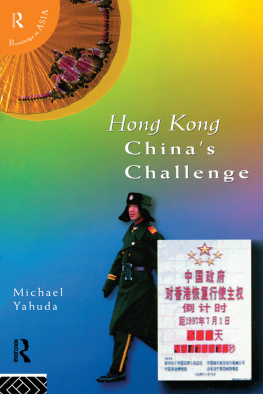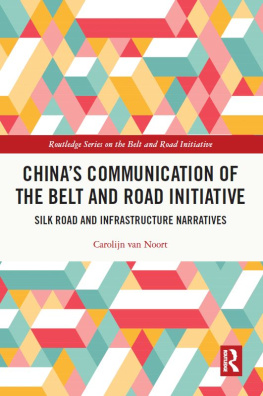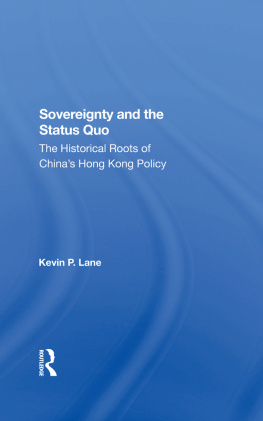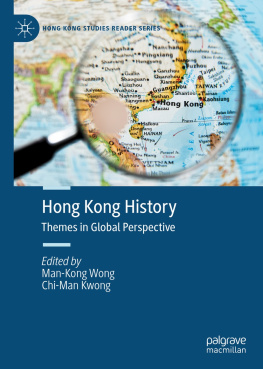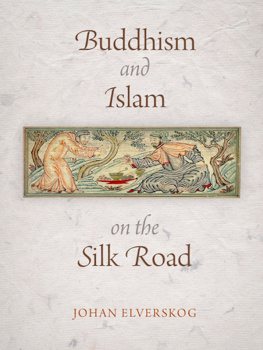Wai-Yip Ho - Islam and Chinas Hong Kong: Ethnic Identity, Muslim Networks and the New Silk Road
Here you can read online Wai-Yip Ho - Islam and Chinas Hong Kong: Ethnic Identity, Muslim Networks and the New Silk Road full text of the book (entire story) in english for free. Download pdf and epub, get meaning, cover and reviews about this ebook. year: 2013, publisher: Routledge, genre: Politics. Description of the work, (preface) as well as reviews are available. Best literature library LitArk.com created for fans of good reading and offers a wide selection of genres:
Romance novel
Science fiction
Adventure
Detective
Science
History
Home and family
Prose
Art
Politics
Computer
Non-fiction
Religion
Business
Children
Humor
Choose a favorite category and find really read worthwhile books. Enjoy immersion in the world of imagination, feel the emotions of the characters or learn something new for yourself, make an fascinating discovery.
Islam and Chinas Hong Kong: Ethnic Identity, Muslim Networks and the New Silk Road: summary, description and annotation
We offer to read an annotation, description, summary or preface (depends on what the author of the book "Islam and Chinas Hong Kong: Ethnic Identity, Muslim Networks and the New Silk Road" wrote himself). If you haven't found the necessary information about the book — write in the comments, we will try to find it.
Wai-Yip Ho: author's other books
Who wrote Islam and Chinas Hong Kong: Ethnic Identity, Muslim Networks and the New Silk Road? Find out the surname, the name of the author of the book and a list of all author's works by series.
Islam and Chinas Hong Kong: Ethnic Identity, Muslim Networks and the New Silk Road — read online for free the complete book (whole text) full work
Below is the text of the book, divided by pages. System saving the place of the last page read, allows you to conveniently read the book "Islam and Chinas Hong Kong: Ethnic Identity, Muslim Networks and the New Silk Road" online for free, without having to search again every time where you left off. Put a bookmark, and you can go to the page where you finished reading at any time.
Font size:
Interval:
Bookmark:

| Basic Law | The mini constitution promulgated in 1990, which outlines in Chinese law the arrangements for the governance of Hong Kong |
| CCP or CPC | Chinese Communist Party or Communist Party of China |
| Chief Executive | Head of the Hong Kong SAR and its government |
| Court of Final Appeal (CFA) CPGLO | The highest court in the Hong Kong SAR Central Peoples Government Liaison Office, the representative office of the central (national-level) authorities in Hong Kong which houses both Communist Party and central government representatives |
| Executive Council | Body which advises the chief executive on policy issues, consisting of political and business figures |
| FCO | Foreign and Commonwealth Office, the foreign ministry of the United Kingdom (UK) |
| Joint Declaration | Agreement, signed in 1984, between the UK and China on the handover of Hong Kong |
| Legislative Council (LegCo) MFA | Hong Kongs legislative body Ministry of Foreign Affairs of China |
| NPC & NPCSC | National Peoples Congress, the highest state institution and legislature of the PRC, and NPC Standing Committee |
| One country, two systems | The principle under which Hong Kong operates as a Special Administrative Region (SAR) of the PRC |
| PRC | Peoples Republic of China |
| SAR | Special Administrative Region, the status Hong Kong and Macao enjoy in the PRC political system |

Font size:
Interval:
Bookmark:
Similar books «Islam and Chinas Hong Kong: Ethnic Identity, Muslim Networks and the New Silk Road»
Look at similar books to Islam and Chinas Hong Kong: Ethnic Identity, Muslim Networks and the New Silk Road. We have selected literature similar in name and meaning in the hope of providing readers with more options to find new, interesting, not yet read works.
Discussion, reviews of the book Islam and Chinas Hong Kong: Ethnic Identity, Muslim Networks and the New Silk Road and just readers' own opinions. Leave your comments, write what you think about the work, its meaning or the main characters. Specify what exactly you liked and what you didn't like, and why you think so.


